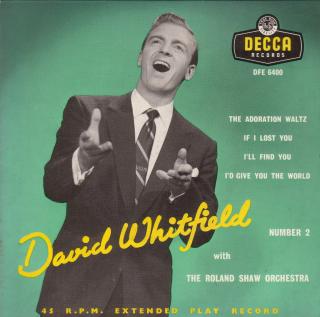|
David Whitfield had a style closer to light opera than that of a popular crooner, and commanded the respect of an admiring older generation through a period in which teenagers, not adults, would become the dominant record buyers. It was a style that he never changed despite the vagaries of fashion and the transient nature of the music industry of the time. He first came to wide public attention during 1950 after appearing in the Hughie Green hosted 'Opportunity Knocks' on Radio Luxembourg- a station that would become the focus for rock and roll music in the UK a few years later. David's own chart career began less than a year after a proper chart, showing the relative sales of recorded music, had begun. He had previously joined the Royal Navy while still in his teens and became a popular performer with his fellow seamen whenever he was given the chance to sing. Although he took a job as a labourer after his demobilisation, he began entering talent contests- including the one for Hughie Green's radio show. It was from this that he found himself in demand nationally and was able to switch from carrying cement bags to singing in the West End of London. It was then a short step to his recording career with Decca. His first big successes were with 'Bridge Of Sighs' and the controversial 'Answer Me'. His greatest success however was with his powerful rendition of 'Cara Mia'- the lyrics of which he claimed to have contributed to himself. This song was so successful that it became the first major US hit for a British artist- an extraordinary feat for 1954. |
|
The EP shown on the right was typical of David's output during the late 1950s. It contained four numbers that benefited well from his powerful, strident, singing voice. However, these were all songs that he'd already had issued as singles. Nevertheless, this EP with sleeve notes and a picture of the singer is an attractive package for Whitfield fans. |

|
| Despite David's wonderful voice, his record sales began to slip at the end of the 1950s and by the early 1960s his career had settled down into stage rather than studio work. His popularity and fame were sufficient to keep his splendid tenor voice in popular demand up until the end of his life. Sadly, David Whitfield died in Australia during 1980. | |
